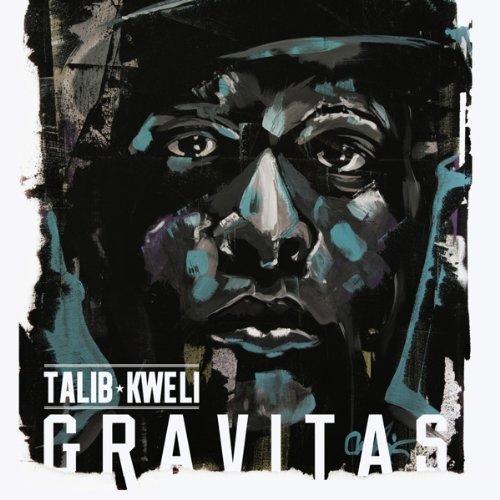
Talib Kweli
Gravitas
Release Date: Feb 18, 2014
Genre(s): Rap, Underground Rap, East Coast Rap
Record label: Javotti Media
Music Critic Score
How the Music Critic Score works
Buy Gravitas from Amazon
Album Review: Gravitas by Talib Kweli
Very Good, Based on 6 Critics
Based on rating 8/10
A maverick if ever there was one, rapper Talib Kweli is quite happy to stroll from the mainstream to the underground while refusing to carry any of the baggage those two camps might throw at him. His 2013 album, Prisoner of Conscious, featured Nelly alongside some "no sell-out" numbers and provided listeners a bit of a rocky ride, but this follow-up feels more natural as it shrugs off preconceptions left and right, flowing effortlessly, even humbly, from its boom-bap opener to its bro-rap closer. That boom-bap is brought on by the loopy, soulful production Khrysis lays underneath "Inner Monologue," an obvious inspiration for Kweli who offers serene moments ("it's the haters that make it bittersweet") and swaggering punch lines ("party like it's Mardi Gras, get the cream like it's Häagen-Dazs") all while a sample of a Neil Gaiman speech explains changing distribution models and how artists can benefit.
Based on rating 4.0/5
Originating from the late ’90s era largely remembered for Hip Hop’s former civil war, Talib Kweli‘s disposition has always stood to bring about change and balance in the mainstream without being overly angry or confrontational. Rather than staging a coup against the music industry, his at times confusing strategy of infiltration has been to broaden his exposure by aligning with those from completely opposite sides of the spectrum, examples not limited to Skyzoo and Gucci Mane. Witnessing the veteran flesh out this identity complex hasn’t made a smooth ride for the set of believers who have confined his ideals to a progressive bent, seeing potential for him to fully betray the pride he once conveyed.
Based on rating 6/10
I remember coming across Talib Kweli’s solo debut, Quality and thinking to myself that I had finally found a rapper that didn’t care about making $1,000,000 and going platinum every day. Kweli just wanted to make music that worked. Music that worked extremely well. And that’s what Quality had going for him.
Based on rating 6/10
Talib Kweli never quite crossed over, and he seems to have made peace with that. The New York underground king and one half of Black Star has always accrued respect and love from backpackers, but seemed out of place on major labels. On his sixth solo album and second independent release, Gravitas, the rapper finds a comfortable groove in his sound and message.
Opinion: Excellent
Most artists in any industry will slow down as they get older, take more time between albums and projects as life’s other distractions tend to take on a bigger role. Someone forgot to tell that to Talib Kweli. The Flatbush-born MC has been on a tear over the past fifteen months, dropping a highly-regarded mixtape, Attack The Block with Z-Trip last September as an appetizer for two albums in 2013, May’s Prisoner of Conscious and Gravitas, which dropped Sunday.
Opinion: Very Good
With his first album of 2013, May’s Prisoner Of Conscious, Talib Kweli indecisively attempted to reconcile his place in the hip-hop zeitgeist—a tall order considering that Kweli’s dense webs of internal rhymes and street-level social activism exists in a world where Rich Homie Quan’s “Type Of Way” inches ever closer to 22 million YouTube views. Regardless, the forefather of “conscious rap” enlisted a handful of mainstream-friendly collaborators (Nelly, Miguel, Curren$y, Kendrick Lamar) and genre-hopped across a collection of scattershot beats ranging from American Gangster-era Jay Z (“Come Here”), the futuristic R&B that seems to be ubiquitous these days (“Ready Set Go”), and a listless stab at hedonistic trap (“Upper Echelon”). But for the most part, Kweli didn’t drastically change his approach to lyrics or production on Prisoner Of Conscious, instead opting to make small alterations to his usual hooks and beats in order to gain the attention of a new audience, all the while staying pretty close to his comfort zone.
'Gravitas'
is available now

